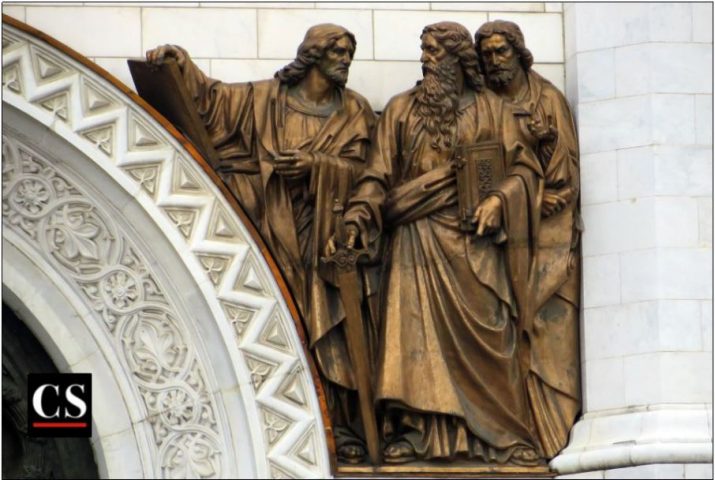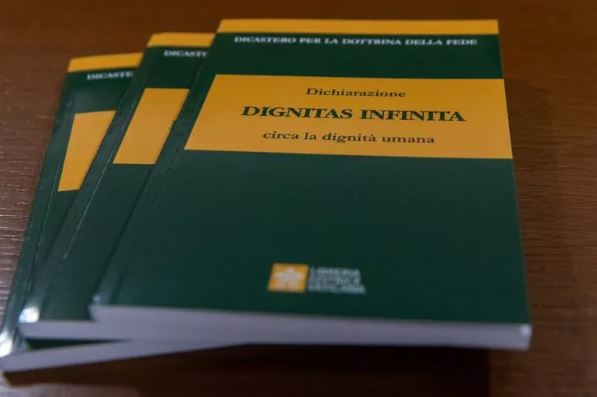An Examination of Conscience Using New Testament Figures

What Everyone Needs to Know About Abortion
January 23, 2018
REPORT: The State of Abortion in the United States, 2018
January 23, 2018
By Allison Low, Catholic Stand, January 19, AD2018
 When we perform an examination of conscience, it is common to use the Ten Commandments as a guide for reflection (as seen here, here and here). But it can also be helpful to meditate on some categories of sins the Church describes: the seven capital sins – or called the ‘seven deadly sins’ – (pride, envy, avarice, acedia, anger, lust and gluttony), the six sins against the Holy Spirit (presumption, despair, resisting the known truth, envy of another’s spiritual good, obstinacy in sin and final impenitence) and those sins referred to as the ‘four sins crying to heaven for vengeance’ (willful murder, the sin of Sodom, oppression of the poor and defrauding laborers of their wages). To better understand these various sins, I have identified New Testament figures in whom some of these sins are manifest. Using these personal examples, we can hopefully be able to recognize these sins in ourselves.
When we perform an examination of conscience, it is common to use the Ten Commandments as a guide for reflection (as seen here, here and here). But it can also be helpful to meditate on some categories of sins the Church describes: the seven capital sins – or called the ‘seven deadly sins’ – (pride, envy, avarice, acedia, anger, lust and gluttony), the six sins against the Holy Spirit (presumption, despair, resisting the known truth, envy of another’s spiritual good, obstinacy in sin and final impenitence) and those sins referred to as the ‘four sins crying to heaven for vengeance’ (willful murder, the sin of Sodom, oppression of the poor and defrauding laborers of their wages). To better understand these various sins, I have identified New Testament figures in whom some of these sins are manifest. Using these personal examples, we can hopefully be able to recognize these sins in ourselves.
Herod the Great
Made king of Judea by the Roman Caesar, Herod the Great was a wicked ruler, and it seems there was nothing too evil or immoral. He was a murderer of many, including his own wife Mariamne and her two sons Alexander and Aristobulus. Trying to gain favor with everyone, he rebuilt the Temple in Jerusalem to gain the affections of the Jewish people but, at the same time, violated Jewish laws by introducing various Roman games, theatres, and gymnasia and building many pagan temples in Judea. When visiting Magi tell him of the birth of a newborn king, he calls for the slaughter of the innocents, hoping to destroy any threats to his reign (Matthew 2:1-23). Knowing he was disliked, various reports say that on his deathbed, he imprisoned some of the most illustrious citizens of Judea and ordered that they were to be executed the moment he died so that tears would be shed at the death of the king.
As we reflect on the extent of evil in Herod the Great, we can be quick to say we are nothing like him. But we must not be presumptuous about our own standing before God. It is not merely murderers who have chosen hell – with every sin we freely commit, we are offending God in some way. So while we are not willful murderers, one sin that plagued Herod haunts us all – the sin of pride.
Pride is the most serious of the ‘seven deadly sins’ and is often called the root of all sin. Pride is the immoderate desire for one’s own excellence and inordinate love of self. It leads to putting self above others, even God. Pride magnifies the defects of others while exaggerating our own abilities, it belittles others and it fails to attribute all we are and have to their true source – God. Thinking we are more important than we are and that our talents are undervalued, we may rationalize sinful behavior when others disagree. If we are always seeking admiration, finding it difficult to apologize, gossiping, speaking detractions or not willing to rejoice in the success of others, we are experiencing the symptoms of pride. We also see pride manifested in Herod when he built many great spectacles and in his many elaborate possessions – are we guilty of these things as well?
We must also recognize pride occurs when we act disrespectfully, unjustly and uncharitably, whether it is to a parent, a peer, a friend, a coworker, someone under our care, etc. If we take pleasure in other’s misfortunes, partake in reckless behavior without concern for others and take revenge, pride is rearing its head. Pride can also be in the heart of those who are disobedient or hostile to the Church, whether it be a ‘cafeteria Catholic’ who selectively rejects doctrines, those who teach in discontinuity to what the Church has taught always, everywhere and to all, or in those who persecute her. One of the most unfortunate presentations of this deadly sin is seen in those who refuse to repent, either claiming their sins are too great to be forgiven (despite the endless mercy of our all-powerful God) or denying they have done wrong or, in their love for self, choosing to remain obstinate in their sins.
Peter, James, and John
Three other figures to consider are Peter, James, and John in the Garden of Gethsemane. Having foretold his suffering and death to the disciples (Matthew 26:1), Jesus goes to the Garden of Gethsemane to pray, taking these three Apostles with him. Despite exhorting them three times to stay awake and pray, Jesus returns to them four times finding them sleeping (Matthew 26:36-46).
In this account, I am reminded of the deadly sin of acedia (sloth). Acedia is when we are lazy particularly in our spiritual life. Acedia prefers rest and relaxation rather than sacrifice. Acedia can be expressed if we are inattentive at Mass (or worse if we complain about going), if we are easily distracted in prayer or if we are careless in fulfilling our religious duties. We can also exhibit spiritual laziness if we have no desire to authentically live our Christian faith, seeing laxity and luke-warmness as adequate. If we lose confidence in the power of prayer, if we have an aversion to spiritual practices (including going to the Sacraments of Confession and the Eucharist frequently) or if we find deepening our faith burdensome, sloth is manifesting itself.
Even though it is described as a form of laziness, acedia is deceptive as it can burden us even in the midst of our ‘busyness’ because, with this sin, we do not have our priorities rightly ordered. If we always have an excuse when there are faith formation opportunities, if we never spend time with our Lord in adoration or if we find that we never have time to pray or read the Scriptures, we may be weighed down by this sin. Also beware, this sin is referred to as the ‘noonday devil’ because it can lead to feeling a lack of purpose, a sense of weariness – especially in our spiritual lives – and it can further lead to the sin of despair.
Simon the Magician
In Acts of the Apostles (8:9-25), Luke introduces us to a man named Simon who had become such a popular magician in Samaria that the people thought he possessed the power of God. After hearing the Gospel, he converted to Christianity and became amazed by the miracles performed by the disciples. He was also impressed by the ability of the Apostles to impart the Holy Spirit to converts through the laying on of hands. Because of this, Simon asked to buy this power. Peter then rebuked him and revealed this request was motivated by bitterness and iniquity.
The bitterness in the heart of Simon the Magician indicates the sin at work within – envy. Envy is when we resent another’s good fortune or joy to the point that we want to see the other person deprived of those goods. There is material envy (related to things such as money, possessions, talents, beauty, friends) and spiritual envy (related to one’s progress in holiness or other aspects of the spiritual life). Envy causes us to be saddened when someone becomes blessed physically or spiritually, disappointed if someone reaches an achievement we desired or annoyed when someone else receives accolades. It is likely plaguing us if we are upset when another is more popular, receives a promotion, is more creative, is more intelligent or is more often sought for advice. And envy not only draws comparisons but is competitive. Acting with envy, we may slander another to attack their status or act unjustly and without charity to make the other fall. This sin is poisonous, not only corroding our own hearts but happily spreading its destruction to others. As it can be difficult to cure, we must recognize it as soon as it begins to manifest itself within us.
Ananias and Sapphira
In Acts of the Apostles, Luke also introduces us to a married couple – Ananias and Sapphira (Acts 4:32-5:11). They sell their home and bring money to Peter, as many were doing in the early Church to help support others in need. Despite claiming they brought their entire profit to the community as the other Christians had done, this couple secretly consented to hold back some of the money. Peter, guided by the Holy Spirit, publicly admonished them for not only what they did but for lying to him and to the Holy Spirit. As a result, Luke tells us both Ananias and Sapphira immediately fall and die.
In this case, the dishonesty and deception of the couple are grave sins but are also signs that a capital sin is at work in them – avarice (greed). Avarice is the inordinate love of and desire for earthly possessions (and it is sinful because it goes beyond desiring what we need is an immoderate desire and attachment). Greed can be the cause of other sins such as theft, burglary, robbery, and fraud, but we may see this in ourselves in more subtle ways. Do we lack contentment for what we have? Do we make excuses for not giving to those in need? Do we always need to have the latest clothing fashions or the newest electronic devices at whatever cost? Do we often buy things on sale simply because one day we may need it? As employees/employers, do we extend our work on the clock even when not necessary or overcharge for our materials and services? And even if we do not cheat, do we work so extensively to earn a salary or to achieve success that we sacrifice our commitments to God, our family and our friends? Do we never think we have enough and always want more? These are likely symptoms of our greed.
Beyond material things, we can also show avarice in our thirst for power and influence. This sin can also cause us to neglect to care for our aging parents as well as for our own children appropriately. Gambling, hoarding and going into debt unnecessarily are often motivated by our greed. And our consumptive culture bombards us with advertisements, which is tinder for this sin. We must be cautious because this offense often begins in a subtle fashion and then grows slowly such that it can blind us to its effects in our lives.
Saul of Tarsus
We first meet Saul when the deacon Stephen is being stoned to death (Acts 7:58). Those who are throwing stones lay their garments at the feet of Saul, suggesting he is not only consenting to this act but orchestrating it. Saul will continue to persecute the Church throughout Jerusalem, arresting men and women (Acts 8:1-3) and even putting many to death (Acts 9:1; 26:10). Though it is admirable to have a zeal for God, Paul later acknowledges that he acted in a “raging fury” (Acts 26:11) and thus was manifesting the capital sin of anger.
While it is not sinful to feel angry in response to external factors (and at times this anger is justified), this capital sin is a sudden outburst of hostility often accompanied by hatred, vengefulness or resentment. If we are angry without cause, if our anger is unreasonable for a situation or if our anger wills evil, it is sinful. In our wrath, we can sabotage others, spew an irrational tirade of insults or act stubbornly or cynically. When we lose our tempers or explode in rage at others, especially those we love, these are symptoms of this capital sin. Often minimized, this sin needs to be identified when present because it does great damage to others and hardens our own hearts, often impeding our growth in holiness.
The Corinthian Man
Paul writes about a scandal in Corinth regarding a man who is in an immoral relationship with his step-mother (1 Corinthians 5:1-13). Ultimately, Paul excommunicates the man for his unrepentance, but he also chastises the community for tolerating the sinful act. It seems that, by God’s grace, this man later repents (2 Corinthians 2:1-11), but this scene recalls the capital sin of lust: the disordered desire of a sexual nature. A prevalent sin throughout human history but especially in our culture today, it can be very easy for us to ignore, minimize or fail to recognize our lust, thus enabling it to only strengthen. When we imagine another as satisfying our own sexual desires, lust is in our heart. If we have sex outside of marriage (adultery, sex before marriage, homosexual acts) or perform impure sexual acts with others/with ourselves, this capital sin is at work in us. Lust also leads to the use of birth control, pornography, prostitution, bestiality, rape, incest and sex addiction. Sexuality is a gift from God that is abused in our lust.
Examination of Conscience
For the health of our soul and our growth in holiness, performing an examination of conscience frequently is essential because some of these sins are subtle and deceptive. Many of them can be spreading their roots in our hearts even now and if we do not recognize their presence, the poisons of these sins can become blinding. In addition to using the Ten Commandments for reflection, do not forget to root out the capital sins, the sins against the Holy Spirit and the sins that cry to heaven for vengeance, many of which we see manifest in these biblical figures.
_________________________
About the Author: Allison Low




